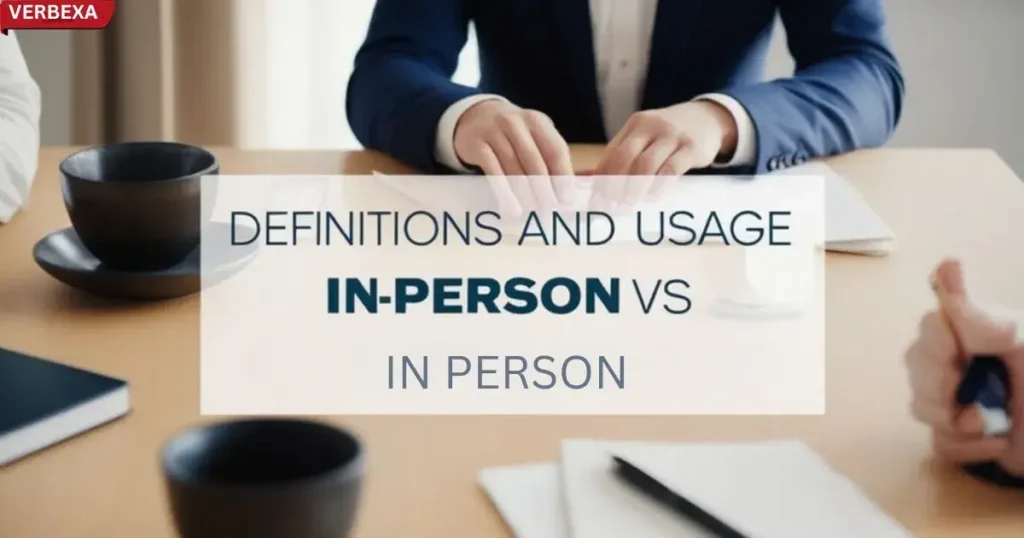Many writers and speakers stumble over the seemingly simple choice between in person and in-person. While both phrases convey the idea of physical presence, they function differently grammatically, leading to confusion. Imagine this scenario: you’re planning a meeting and need to specify the format. Should you say “We’ll have an in-person meeting,” or “We’ll meet in person“? The answer impacts clarity and professionalism.
Imagine sending an important client an email about a meeting. You write, “Let’s discuss this in-person,” only to second-guess yourself. Is that hyphen correct? Does it matter? The answer is a resounding yes! TThis article will dissect the difference between in person and in-person, helping you confidently choose the right option in any context.
Definitions and Usage: In Person vs In-Person

In Person (Adverbial Phrase)
In person, as an adverbial phrase, modifies a verb, adjective, or another adverb. It describes how an action is performed – emphasizing physical presence. It answers the question “How?” or “In what manner?”.
Examples:
- I apologized to him in person. (modifies the verb “apologized”)
- She felt much better speaking to her doctor in person. (modifies the verb “speaking”)
- It’s always more effective to discuss the details in person. (modifies the adjective “effective”)
In-Person (Adjective)
In-person, functioning as an adjective, describes a noun. It modifies nouns like meeting, interview, or event to specify that they involve physical presence. It answers the question “What kind of?”
Examples:
- We scheduled an in-person meeting. (modifies the noun “meeting”)
- The in-person interview went well. (modifies the noun “interview”)
- The company is finally holding an in-person workshop for its employees. (modifies the noun “workshop”)
The key difference between in person and in-person lies in their grammatical roles: one modifies a verb (or adjective/adverb), the other modifies a noun.
Synonyms: Alternative Ways to Express Physical Interaction
In Person Synonyms:
- Personally
- Face-to-face
- Directly
- Physically present
- Bodily
- Contemporaneously
- Immediately
- Proximately
- Corporally
- Substantially
In-Person Synonyms:
- Physical
- Direct
- Face-to-face
- Personal
- Proximate
- Immediate
- Live
- Real-world
- Present
- Corporeal
Comparison Table: In Person vs In-Person
| Feature | In Person (Adverbial Phrase) | In-Person (Adjective) |
|---|---|---|
| Grammatical Role | Modifies a verb, adjective, or adverb | Modifies a noun |
| Definition | Describes how an action is performed; emphasizes physical presence. | Describes an event or interaction as involving physical presence. |
| Example | I met with my client in person. | We had an in-person meeting. |
| Common Usage | More common in casual and everyday speech. | More common in formal writing and descriptions of events. |
Contextual Usage of Terms

The choice between in person and in-person depends entirely on the word it modifies and your desired emphasis. If you are describing how something is done (method), use “in person“. If you’re describing what kind of something it is, use “in-person.”
Understanding the difference between in person and in-person in this light makes the selection clear. You’ll find that in most cases the context dictates the best choice.
Everyday Usage Examples: Real-World Context
- Incorrect: “Let’s have a in-person conversation.” Correct: “Let’s have an in-person conversation.”
- Incorrect: “He delivered the news in-person.” Correct: “He delivered the news in person.”
- Correct Usage: “Our neighborhood prefers in-person community meetings held in person.”
Is It Better to Meet In Person Or Online?
While this article focuses on grammar, it’s worth mentioning the practical considerations of choosing between an in person or in person meeting and an online meeting. Often, in-person interactions foster better rapport, deeper understanding, and stronger relationships.
However, online meetings offer convenience and cost-effectiveness, especially when geographical distance is a factor. The best option depends on your priorities. Considering the in person or in person meaning within a larger context, like meeting efficiency, will guide your decision.
FAQs
Is it in person or in-person?
The choice depends on its grammatical function; use “in person” to describe how something is done and “in-person” to describe what kind of event or interaction it is.
Is it in-person or in person?
“In-person” modifies nouns (e.g., “in-person meeting”), while “in person” modifies verbs or adjectives (e.g., “attend in person”).
Should in-person learning be hyphenated?
Yes, “in-person learning” uses a hyphen because “in-person” acts as an adjective modifying the noun “learning.”
Conclusion: Mastering the Nuance
Understanding the difference between in person and in-person isn’t just about grammar—it’s about communicating with precision and professionalism. Whether you’re writing a client email, preparing for an interview, or organizing a workshop, these subtle distinctions matter.
Remember:
- In person = How something happens
- In-person = Type of event/interaction
Mastering these terms will elevate your writing and communication, ensuring clarity and demonstrating linguistic finesse.
Quick Reference:
- Adverbial Phrase: In person
- Adjective: In-person
- Physical Presence: Core meaning of both terms

This author is a passionate linguist and grammar enthusiast, dedicated to helping individuals master the art of language. With years of experience in teaching and editing, she brings clarity and precision to every sentence. Tina’s mission is to empower writers of all levels to express themselves with confidence and excellence.

